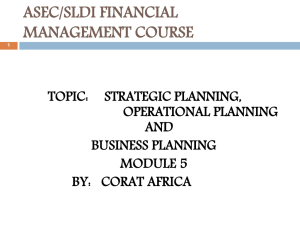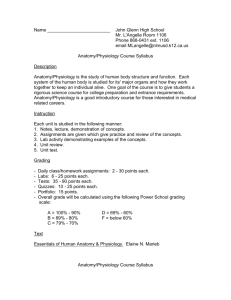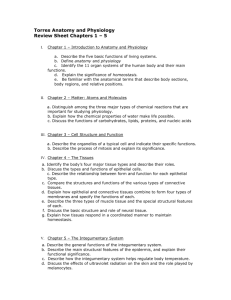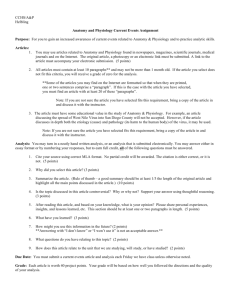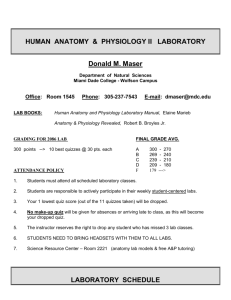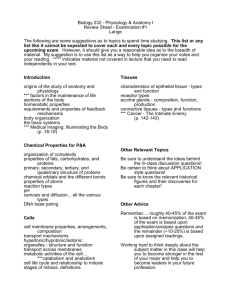Course Description
advertisement
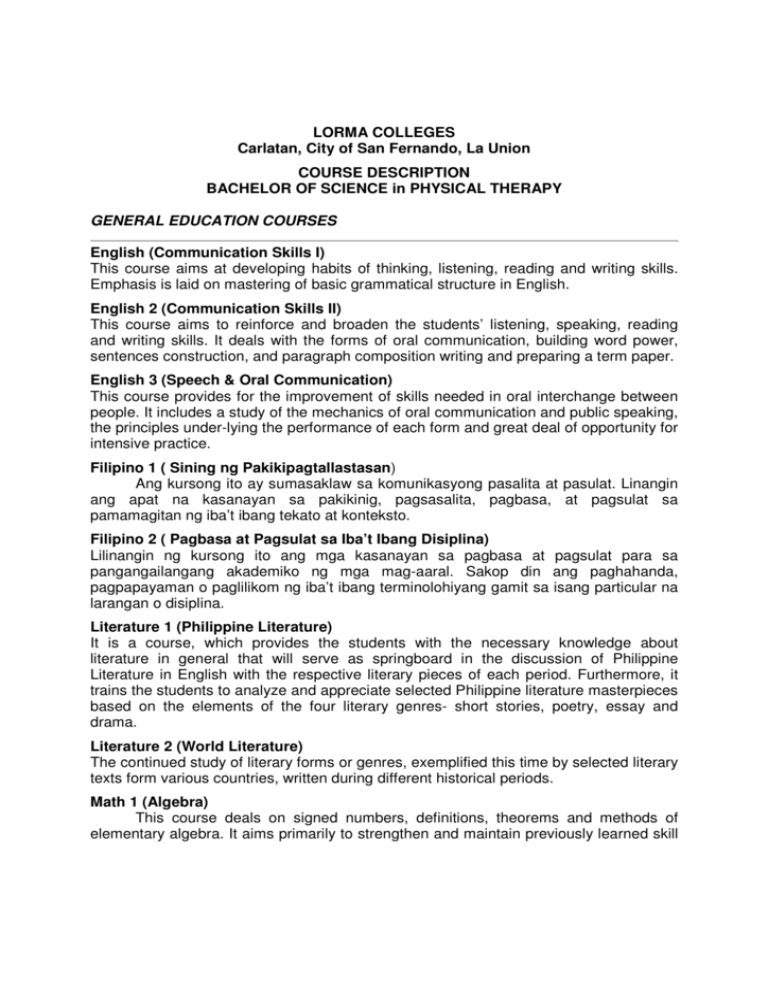
LORMA COLLEGES Carlatan, City of San Fernando, La Union COURSE DESCRIPTION BACHELOR OF SCIENCE in PHYSICAL THERAPY GENERAL EDUCATION COURSES English (Communication Skills I) This course aims at developing habits of thinking, listening, reading and writing skills. Emphasis is laid on mastering of basic grammatical structure in English. English 2 (Communication Skills II) This course aims to reinforce and broaden the students’ listening, speaking, reading and writing skills. It deals with the forms of oral communication, building word power, sentences construction, and paragraph composition writing and preparing a term paper. English 3 (Speech & Oral Communication) This course provides for the improvement of skills needed in oral interchange between people. It includes a study of the mechanics of oral communication and public speaking, the principles under-lying the performance of each form and great deal of opportunity for intensive practice. Filipino 1 ( Sining ng Pakikipagtallastasan) Ang kursong ito ay sumasaklaw sa komunikasyong pasalita at pasulat. Linangin ang apat na kasanayan sa pakikinig, pagsasalita, pagbasa, at pagsulat sa pamamagitan ng iba’t ibang tekato at konteksto. Filipino 2 ( Pagbasa at Pagsulat sa Iba’t Ibang Disiplina) Lilinangin ng kursong ito ang mga kasanayan sa pagbasa at pagsulat para sa pangangailangang akademiko ng mga mag-aaral. Sakop din ang paghahanda, pagpapayaman o paglilikom ng iba’t ibang terminolohiyang gamit sa isang particular na larangan o disiplina. Literature 1 (Philippine Literature) It is a course, which provides the students with the necessary knowledge about literature in general that will serve as springboard in the discussion of Philippine Literature in English with the respective literary pieces of each period. Furthermore, it trains the students to analyze and appreciate selected Philippine literature masterpieces based on the elements of the four literary genres- short stories, poetry, essay and drama. Literature 2 (World Literature) The continued study of literary forms or genres, exemplified this time by selected literary texts form various countries, written during different historical periods. Math 1 (Algebra) This course deals on signed numbers, definitions, theorems and methods of elementary algebra. It aims primarily to strengthen and maintain previously learned skill foundation laid in the high school years and enabling the students to be better prepared for more high standard kind of algebra. Math 2 (Trigonometry) This course deals with the indirect measurement of angles, line segments and sides of a triangle. It gives the emphasis on the study of the trigonometric functions of an acute angle, solutions of a right triangle and obligue triangle, common logarithmic trigonometric formulas and identities. Math 3 (Basic Statistics) This course deals with the introduction to the concepts of basic Statistics, also of probability, random variables, discrete and continuous probability, distribution, sampling theory, estimation, test of hypothesis. Soc & Anthro (General Sociology & Anthropology) Sociology and Anthrophology incorporates two areas relevant in studying culture and society in general.Sociology and Anthropology combined will aim to emphasize application of the finding in terms of social living and social interrelationship with man and his society as the subject matter.Anthropology will be dealing on what happened in the past and Sociology tackles on what is going on at the present time. History 1 (Philippine History & New Constitution) The course deals with the systematic and comprehensive study of the government, state and the constitution of the Philippines. Primarily it is concerned with how the government operates and its functions to the growth and development of not the government but also the society in general. A systematic comprehensive careful study of the course makes one aware of the definition and limitation of the power vested in the government and the rights of the people with its state. Furthermore it enhances nationalistic feeling and cooperation of the people. Knowing the different principles that govern each public affairs and relationships help the student realize and feel that they too need to take stand in the development of Philippine society. Philo & Logic (Philosophy & Logic) This course is designed to introduce the students to the basic concepts of logic and the applications used. It discusses the nature, functions and application of reasoning, the uses of daily language definition and format, providing theories and techniques. It includes also a section of fallacies, which all expose errors in reasoning even in everyday communications, and which will provide ways and means to minimize these tendencies of violating the rules of logical reasoning. Psychology (General Psychology with Drug Education) This course deals with the study of human behavior. It is particularly focused on what, why and how of human behavior. Drug education and prevention has been incorporated in the subject matter. Practical applications of the concepts and theories to everyday lives of students are provided through the different learning experiences conducted with the students. Health Eco (Health Economics) This course deals with the Philippine economic life and experience. It includes the production of wealth, commodities, and services, their utilization after they have been produced. It also includes the study of Comprehensive Agrarian Reform program and Taxation, its theories and application in order to guide and assist the students in their tasks and their undertakings. Rizal (Life, Works & Teaching of Dr. Jose Rizal) This course deals with the life, works and writings of Dr. Jose Protacio Mercado Rizal. It aims to present to the students the different attributes that made him acclaimed, "Great Malayan". It presents the richness of Rizal's thought and teaching, which are his living legacies to human race. The course further aims to let the students see themselves in Rizal and that they may learn to love their country more. Zoology 1 (General Zoology) This course deals with the anatomy, physiology, cytology, taxonomy and histology of animals. It introduces the different kinds of protozoa and parasites. It includes the application through laboratory experiments. It covers also the dissection of animals particularly the frog. Biology 1 (General Biology) This course deals with the structural and physiological principles of the plants and animal cells. The different organs and systems found in the plants and animals will be covered. The introduction to chemistry will be incorporated in the different topics. Physics 1 (General Physics) The course deals with the study of matter and energy. The course includes the topics basically in mechanics, electricity and magnetism and its application to the different medical fields. It gives an opportunity to the student to learn and understand the principles of physics by actual observation and performance through laboratory experiments. Physics 2 (Applied Physics) Applied Physics deals with the study of heat, sound, wave, light and electricity. It includes the study of the mathematical description of these quantities and the mathematical representation of different laws of Physics. It also involves the application of the laws of Physics to practical situations. This course of consists 3 hours lecture and two hours of laboratory. Chemistry 1 (General Chemistry) It is a course which deals with the study of the basic principles in chemistry, its test and measurements, the atomic structure of chemicals, the oxidation- reduction, reactions of substances, different gas laws, solutions- its preparations and methods of expressing their concentrations are also included which could help the students prepare and assimilate the basic inorganic chemistry. Applications though experiment that are most suitable for medical students are included. Chemistry 2 (Organic Chemistry) This course covers the study of organic compounds according to their chemical structure, methods of preparation, properties and chemical behavior. Emphasis is placed on modern concepts of chemical bonding, orbital theory and resonance in reaction mechanisms. Industrial and biological application and uses of organic reactions and their products are also taken up. Education 3 (Methods of Teaching) This course includes the discussion of the basic principles and theories of teaching and learning. It includes further the construction of test questions, semi-detailed lesson plan, syllabus, table of specification and an application of the theories of learned through Micro-teaching. Education 5a (Intro to Research & Research Proposal) Basic concepts of research, including development of conceptual framework, types and methods of research; provides opportunity to write research proposal. Education 5b (Research Implementation and Presentation) Implementation and presentation of research Computer 1 (Basic Computer) This course deals with the fundamental concepts of computer. It consists of the introduction to data processing, history of computers and facts about computer developments. It will also cover partly some concepts on word processing and introduces the Turbo Basic language. PE 1 (Physical Fitness) This course includes instructions and practice of alignment, positions, facing, posture and gymnastic free hand and other physical fitness exercises and skills. PE 2 (Rhythmic Activities) PE 2 includes steps, movements and music related to dance particularly social dance, foreign dances and also the Philippine folk dances. These social dances when learned by students foster camaraderie and sociability among the different members of the society. These dances aim to keep individual's suppleness and develop coordination, flexibility and to keep the body graceful. PE 3 (Individual and Dual Sports) Practice in fundamental skills and study of the rules in Badminton, Table tennis, Bowling, Karate, Arnis and Teakwondo and other Filipino sports. PE 4 (Team Sports) This course deals on team sports or events competed or contested among groups or teams. Some of these team sports which involve physical exertions are the following: football/ soccer, baseball/ softball, European hockey, and giving emphasis to basketball. Bible 1 (Christian Foundation) This course is an introduction of the story of the Bible, the nature and being of God and the power of God’s word in one’s life with emphasis of the life, person and ministry of the Lord Jesus Christ. It also embraces biblical and Christian values that will inspire the students to live uprightly and to achieve excellent and honorable aspirations. Bible 2 (Christian life and Ethics) This course introduces the individual students in the development of dynamic Christian life and ethics that will gear to a potential and harmonious relationship with his God , his family, his community and his life. NSTP 1 and 2 - Civic Welfare Training Service 1 and 2 The Civic Welfare Training Service (CWTS) is one of the three components of the National Service Training Program (NSTP). NSTP is a program aimed at enhancing civic consciousness and defense preparedness in the youth. It is attained by developing the ethics of service and patriotism specifically designed to enhance the youth’s active contribution to the general welfare. CWTS 2 is designed to train, encourage and help students to organize, plan, implement and evaluate community projects and activities. This will contribute to the general welfare and betterment of the life of community members that will lead to community development. It is intended for improving health, education, safety, livelihood, environment, entrepreneurship, arts, recreation, morals of the citizenry and other social welfare services. Health Care with RLE This course is offered to second year BS Physical Therapy students which provide the core essentials concerning the multidisciplinary aspects of patient care. This course provides the students and introduction to the theories, concepts, models and skills needed in understanding health and illness in relation to the provision of services in the health care facilities. It also includes discussion on the concepts and principles in the provision of basic care in terms of health promotion/ maintenance and disease prevention at the individual and family level. MEDICAL AND PHYSICAL THERAPY COURSES Anatomy 1 (Human Anatomy and Physiology) This course will include instruction on basic structure and function of the body; basic chemistry; description of cells and tissues; function of each body system: Integumentary, skeletal, muscular, nervous, endocrine, circulatory, lymphatic, respiratory, digestive, urinary, and reproductive; The three units lecture provides three hours of class discussion and presentations and a two unit laboratory that includes six hours of interactive and multi modal learning that incorporates library work and technologically-based presentations with group work and individual student participation. Basic medical terminology will also be introduced so that the student is better prepared to understand and communicate with other health care professionals. This course will also serve as the student’s foundation in the study of more advance topics in anatomy and physiology. Anatomy 2 (Gross Anatomy and Organ System) Basic human gross and organ system anatomy Anatomy 3 ( Neuroanatomy ) Structures and functions of human nervous system and its clinical implications. Anatomy 4 (Kinesiology) Human Biomechanics in relation to normal and dysfunctional locomotion and activities of daily living. Physiology 1 (General Physiology) Understanding basic processes and functions of the human body. Physiology 2 Neurophysiology and Organ System Physiology) This course deals with the integration and relationship of the normal structures and functions of the different body systems with emphasis on the extensive study of the nervous system as it is related to the other courses offered for Physical Therapy students. Other systems included are cardiac, respiratory, Digestive, endocrine, circulatory and immunology, renal and reproductive systems. Laboratory exercises at the end of most learning topics to allow integration and application of the knowledge learned. Some pathologic or disease entities are discussed as part of the integration of the basic learning to clinical- set-up in an attempt to introduce students for future clinical exposure. Psychiatry (Psychiatric Foundations) Introduction to medical terminology in psychiatry, diagnostic classification of psychiatric conditions and treatment methods used in psychiatry. Human Dev (Human Development) Theories and principles of growth and development: various stages of growth and development in terms of motor perceptual, cognitive, language and psychological aspects: including effects of disability on the growth pattern in each age group. Patho & Micro (General Pathology and Microbiology) Fundamentals of general pathology and microbiology with emphasis on cellular adaptations and tissue/ cellular reaction to inflammation and injury, degenerative processes and tissue repair. MS 1 (General Medical Conditions) Cardiovascular, rheumatologic, integumentary, pulmonary, endocrinologic, genetic, infections, pediatrics and nutritional conditions with emphasis on etiology, pathomechanics, pathophysiology, signs, symptoms, course, prognosis, and medical and pharmacologic management. MS 2 (Neurology) Introduction to neurology, including diseases of central and peripheral nervous systems, including effects of drugs on common neurological conditions. MS 3 (General Surgical & Orthopedic Conditions) General orthopedic and surgical conditions that lead to activity limitation and or participation restriction with emphasis on etiology, pathomechanics, pathophysiology, signs, symptoms, course, prognosis, and medical, pharmacologic management and physical therapy management. PT Pharma (PT Pharmacology) The course is designed for physical therapy students for them to acquire a sound basic understanding of pharmacology as it relates to their particular needs. It makes no attempt to be fully comprehensive & cover all aspects of pharmacology; rather it attempts to present a basic rationale for understanding current drug therapy. This course puts emphasis on current drug therapy & their therapeutic applications, pertinent physiology & related diseases are viewed before the pharmacology of the drug is discussed. O/P ( Orthotics and Prosthetics) Biomechanical principles applied to orthotic and prosthetic devices of the upper extremity, lower extremity, and spine with emphasis on screening, fitting, check- out, and training for orthotic and prosthetic use. PT 101 (Introduction to Physical Therapy) This course covers topic discussion on the basic information the health care system, rehabilitation and with greater emphasis on the physical therapy course and profession. PT 102 (Medical Language) This course is offered to the second years BS Physical Therapy students. The students are introduced to the basic terms used by the paramedical courses. They are taught to analyze the different word parts, build medical terms and pronounce it correctly. This will help them relate to or understand other paramedical courses using the medical language. PT 103 (Introduction to Patient Care) This is a 2-unit course offered to 2nd year BS physical therapy students which deals with basic Physical Therapy principles and techniques in patient care such as positioning transfers and assistive devices. It also includes discussion on terms and abbreviations use in Physical Therapy, assessment of vital signs and aseptic techniques. Thus, this course enables the students to know and understand the significance and role of a Physical Therapist in the field of Physical therapy and rehabilitation Medicine. PT 104 (Integrated PT Seminar) The course covers discussion and demonstration of physical therapy procedures, tools and evaluation techniques specific for selected conditions and problems such as posture, muscle tone abnormalities, pain and tenderness and pathologic end feel which usually confront physical therapists. Demonstration, return demonstration and actual application will be utilized to enable the students recognize and understand the significance of different assessment tools for specific physical conditions in the field of physical therapy. PT 1 (Patient Care and Hydrotherapy) This covers the general techniques of patient care. It includes discussion of the different physical agents like water, ice, paraffin wax and massage for therapeutic use. It also includes discussion on the principles, physical, physiological effects, indications and contraindications of the different physical agents. This will allow students in their decision – making especially on the selection of tools or physical agents to treat the many conditions seen in patients. Physical therapy terms and abbreviations and documentation will likewise be discussed. PT 2 (Light and Thermal Agents) Principles, techniques, physical and physiological bases, indications and contraindications for therapeutic use of heat, cold, light and water includes evidencebased practice on use of modalities. PT 3 (PT Examination and Evaluation) Principles and techniques of examination such as musculo- skeletal, orthopedic, neurological, functional, motor control and coordination, to guide formulation of PT treatment goals and plans; includes introduction to techniques of history taking, evaluating results of examination using critical reasoning, and accurate documentation of findings according to prescribed format. PT 4 (Electrotherapy) Principles, techniques, physical and physiological bases, indications and contraindications for therapeutic use of electrical currents; includes evidence-based practice on use of modalities and implications of results of electrodiagnostic tests on electrotherapeutic management. Thera Ex 1 (Basic Therapeutic Exercises) Principles and physiology of exercises for all ages, general types and classifications including ROM, strengthening, joint and soft tissue mobilization, stretching, aerobics and aquatic exercises: integrates evidence – based practice on use of techniques. Thera Ex 2 (Therapeutic Exercises for Medical Conditions) Development of exercise programs for musculo-skeletal, orthopedic, rheumatologic, cardiovascular, pulmonary and integumentary conditions, and basic teaching skills for implementation of exercises; includes planning home exercise programs for patients, families or community groups. Thera Ex 3 (Therapeutic Exercises for Surgical, Nero & Pedia) Theories and techniques of specialized exercise regimen specific to surgical, neurologic and developmental pediatric conditions. Seminar 1 (Clinical Correlations for Medical Conditions) Principles governing effective diagnosis, goal setting, treatment planning, and management of patients with orthopedic, rheumatologic, cardiovascular, pulmonary and integumentary conditions; includes introduction to clinical reasoning. Seminar 2 (Clinical Correlations for Surgical, Neuro, Pedia Conditions) Application of clinical reasoning skills in effective diagnosis, goal setting and treatment planning fro surgical neurologic and developmental pediatric conditions. Clin. Ed 1 & 2 (Introduction to Clinics 1 and 11) Integration of assessment, treatment and documentation skills for patients with orthopedic, rheumatologic, cardiovascular, pulmonary, and integumentary conditions, from referral to re-evaluation, discharge and community reintegration. Ethics (Ethics in PT) Application of ethical principles and the process of ethical reasoning to situations and dilemmas encountered by physical therapists in practice. O/A (Organization and Administration) Principles and functions of management relevant to PT practice. Clin Educ. (Community Based Rehabilitation) Theories and principles of community – based rehabilitation in the Philippines context. Clinical Internship This will consist of ten full months of clinical internship duty in various physical therapy departments of hospitals/rehabilitation centers within cities and provinces of Luzon and in a Community Based Rehabilitation rotation. The monthly training is facilitated and provided by the clinical supervisors of the hospital/rehabilitation or community based center. Supplementary lectures and examinations are administered in the hospital/rehabilitation centers by the clinical supervisors and in the school through the internship coordinators.
